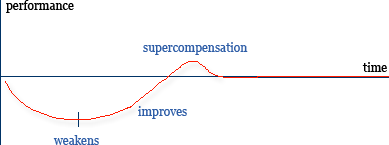In order to improve your skills and technique, you will need good learning and practice environments, appropriate and correctly guided practice, and suitably demanding exercises for your skill level. The aim of instruction is to enable you to give a finely honed and successful performance under pressure and in difficult conditions. Learning top-level technique also requires you to have good physical attributes.
Even though you are practicing regularly, you may sometimes feel that you are no longer improving and arent achieving your goals, no matter how much effort you put in.
One reason for this sudden halt in development may be a lack of planned practice. Although you have set yourself realistic goals and a sensible timetable, improvement will plateau if your practice is too formulaic. If you get stuck in a training rut, your body will not get the variety it needs to improve. Your body will get used to familiar stimuli, and familiarisation does not promote development.
Overloading can also arrest development, as your muscles dont have a chance to fully recover. With time, your body will go into an overtrained state. Your playing will lose its sensitivity and suppleness, which may lead to a weak and rigid performance.
Your body has a natural urge to achieve balance. It seeks familiar and safe rhythms in, for example, sleeping and eating. Likewise, its easy to get into habits when practicing. However, the secret to improvement lies in this desire for balance. Because your body is always striving to adapt to loading, practice causes your body to carry out repairs. When repairing the damage caused by practice, your body usually slightly overcompensates, that is, makes your tissues a little bit stronger than before just to be on the safe side. Your muscles get stronger and your form improves. This phenomenon is called supercompensation. The more demanding your practice, and the more unfamiliar it is, the greater the overcompensation it triggers in your body.
It takes about 24 hours (10-40) hours for your system to regenerate after the stress. If you want to take advantage of the supercompensation that follows the recovery period, you should ensure that your practice schedule has a lighter day after each heavy day, so that your body has time to strengthen itself in peace. After an extremely heavy day you have to remember to give even more time for your body to recover.
Practice makes you tired and depletes your energy reserves. Correctly timed loading and recovery will ensure that energy levels are replenished and that you will achieve your desired training effect. You must also remember to note your own bodys tolerance level (discuss this with your instructor) and tailor your practice to your personal energy reserves and recovery period.
Demanding exercises and practice periods will help you increase your strain resistance. Light exercises and periods will maintain your current attributes, improve skills and sensitivity, promote a physically economic performance, and enable recovery. Finding the correct rhythm will therefore increase the efficiency of your demanding practice sessions, promote recovery, and accelerate improvements in your performance (supercompensation).


